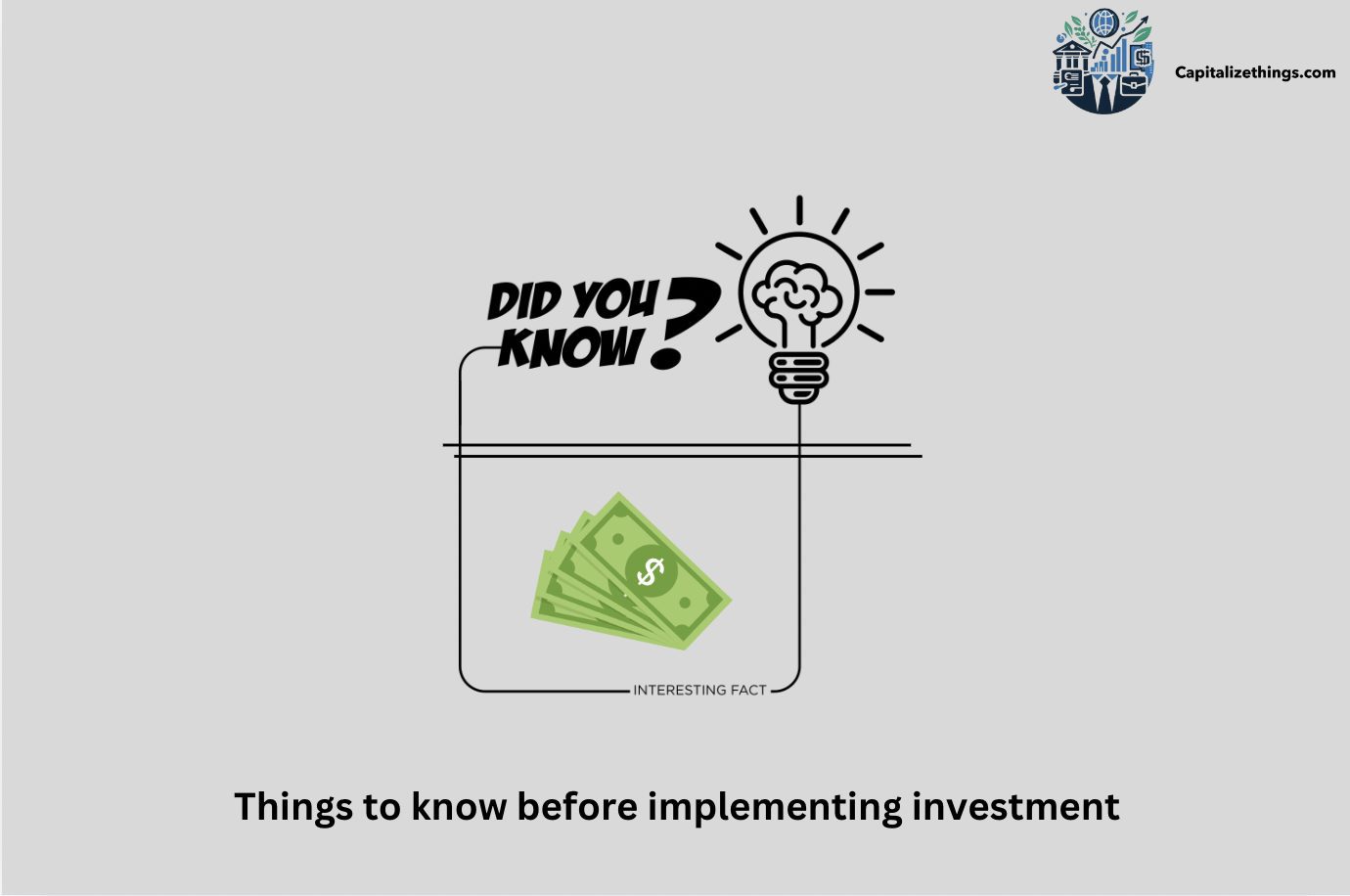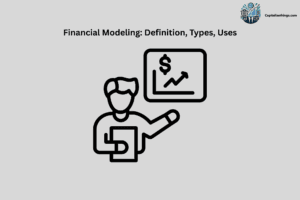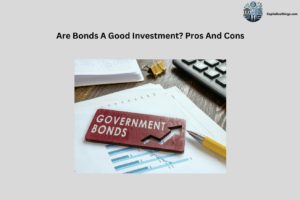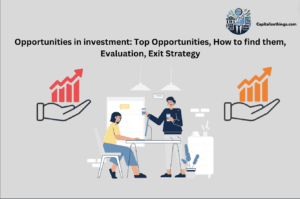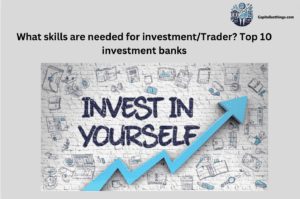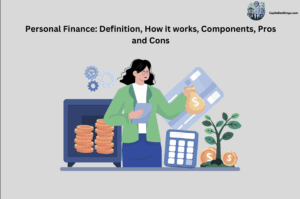Investment involves buying assets with your own money in hopes of a rise in value and income. Properties like houses, art, and gold coins are examples. They could also be financial assets like company shares, corporate bonds, and government bonds. Choosing the right assets requires knowing your investment term. Understanding your investment motives lets you work logically to invest.
Exchangeable assets are known as financial instruments. Financial instruments include stocks, bonds, ETFs, CDs, loans, mutual funds, and derivative contracts. Financial instruments help global investors transfer capital efficiently. They could involve cash, a contractual right to give or receive currency another financial instrument, or property in a company.
Capital markets allow buyers and sellers to exchange financial securities like stocks, bonds, etc. Participants include persons and institutions. Asset management is about making good judgments and maximizing value. A typical goal is to minimize asset life costs, although risk and business continuity can also need to be considered objectively.
Wealth management involves structuring and arranging money to build, preserve, and protect it while passing it on to the family tax-efficiently and according to their wishes. Tax, succession, wealth protection, estate, and family governance comprise wealth management.
Based on customer needs and goals, advisory services cover many IT areas. To integrate investments and efforts with company plans and priorities, IT strategy defines an IT vision, goals, mission, and roadmap. IT governance helps create and improve IT rules, standards, processes, and controls to meet legislation and best practices.
Investors can profit from investment real estate. Investment homes can provide income, wealth, and diversification. There are various sorts of real estate, but most can be categorized into two.
What is investment?
Investing involves purchasing assets that appreciate and generate income or capital gains. Investing can also mean investing time or money to better your life or others. In finance, investing is buying real estate, securities, and other assets for a profit or income. Simply put, investing involves buying an object at a low price and selling it for more. This investment return is called a capital gain. A technique to make cash investing is to sell things for a profit or realize capital gains.
Buying and holding income-generating assets works alongside capital gains and appreciation. Instead of selling assets to realize capital gains, income investors buy cash-flowing assets and hold them. For instance, many equities pay dividends. Instead of trading dividend stocks, investors hold and earn from dividends.
What is fidelity investment?
Boston-based Fidelity Investments is an international financial services company. As of June 2024, Fidelity Investments works as a brokerage firm, manages an extensive family of mutual funds, offers investment advice and fund distribution, retirement services, wealth management, index funds, securities execution and asset custody, clearance, and life insurance. It was founded in 1946.
With over 140 investor centers nationwide, Fidelity Investments is a prominent brokerage firm. Fidelity Investments a subsidiary, of National Financial Services LLC, gives brokerage clearing along with back-office support and investments software to corresponding broker-dealers, financial institutions and trusts, family offices, and registered investment advisors. National Financial held $443 billion in 4.3 million accounts as of September 30, 2010. They have various backgrounds in fields beyond financial planning. They offer career opportunities in their scope. Their benefits meet your needs throughout life.
What is an investment calculator?
The Investment Calculator calculates investment plan parameters. Tabs indicate the desired parameter. Return Rate calculates the return rate needed to meet an investment goal using given inputs. Money is invested to make greater profits. The Investment Calculator can estimate one of several fixed-rate investment factors.
Variables involve in investment
Four essential components make up a conventional financial investment.
- Rate of return
For many investors, this is crucial. The percentage appears simple, but it is used for assessing the attractiveness of different financial assets.
- Initial amount
This is the initial investment amount, sometimes called the principle. It can be a substantial sum saved for a property, an inheritance, or a gold acquisition.
- Last amount: The desired investment payout.
- Duration of investment
Longer investments are riskier owing to uncertainty. Higher periods invested usually mean higher compounding of return and greater returns.
- Extra contribution
Without annuity payments, investments can be made. However, extra contributions during an investment’s lifetime will increase its cumulative return and value.
What is an Elliott investment in Southwest Airlines?
Elliott Investment Management, Southwest Airline’s largest stakeholder, thinks Southwest has the best airline turnaround prospect in 20 years. They want Southwest to be a top airline again. Stronger Southwest proposes obvious performance improvements for clients, staff, and investors, including:
- Restoring efficiency to maintain low fares
- Adapting the product line to customer needs
- Developing management skills to boost operational performance
- Allowing technology and asset investments to maintain a reliable business for passengers and workers
- They look forward to working with Southwest to restore best-in-class performance as one of its largest investors.
What is a fisher investment?
Fisher investment assists families in examining their finances, planning for the future, and investing to achieve their goals. Fisher Investment puts clients first in financial strategy and annuity appraisal. The top-down investment strategy starts with macroeconomic concept development, which informs our nation, sector/industry, and thematic preferences—the major drivers of portfolio results. From there, they analyze individual securities to find those that best match our higher-level tastes and are likely to beat their peers.
They also think that this method is ideal for portfolio management and distinguishes them from other investment managers who utilize bottom-up approaches that view sector or nation decisions as by-products of company choosing. They believe our top-down methodology offers more outperformance opportunities than other methods since they actively manage these critical higher-level decisions.
What are the precautions before investing in stocks?
Considering recent market occurrences, you should modify your investing portfolio. Before making a decision, examine these 8 key areas:
- Plan your finances
Sit down and honestly assess your financial circumstances before investing, especially if you’ve never done so previously. Goal-setting and risk tolerance with a financial advisor or alone start successful investing. Investment returns are not guaranteed. But if you learn about investing and saving and follow a smart strategy, you should be able to build financial security and enjoy the rewards of money management over time.
- Assess your risk-taking comfort level.
All investments include risk. Before investing in stocks, bonds, or mutual funds, you should know that you could lose money. Securities investments are not federally protected like FDIC- and NCUA-insured bank deposits. Your investment principal could be lost. This is true even if you buy investments through a bank.
Risk-taking can boost investing returns. If you have a long-term financial goal, you can generate additional funds by carefully investing in riskier asset categories like stocks or bonds rather than cash equivalents. Cash-only investments can be suitable for short-term financial goals. The biggest concern for cash equivalent investors is inflation risk, which could exceed and reduce profits.
- Think about the investment mix
Investors can avoid large losses by including asset classes with volatile returns in their portfolios. The returns of bonds, stocks, and cash have rarely fluctuated together. Market conditions that boost one asset category often hit another with mediocre or poor returns. By investing in multiple asset classes, you’ll lower risk and level out your portfolio’s returns. You can compensate for losses in one asset category with higher returns in another.
Asset allocation also affects whether you reach your financial goal. Your portfolio can not earn enough to fulfill your goal if you don’t take enough risk. If you’re preparing for retirement or college, most financial gurus recommend including stock or stock mutual fund investments in your portfolio.
- Be cautious when investing extensively in employer or individual stock.
Diversifying your investments is a key approach to reducing investment risk. Avoid placing everything in one basket. By selecting the correct assets within an asset category, you could be able to limit losses and investment return variations without losing potential gain. Heavy investment in your employer’s or any other person’s stock exposes you to severe financial risk. If the stock sells poorly or the organization goes bankrupt, you can lose a lot of money and your job.
- Establish and maintain an emergency fund.
Most wise investors save enough for an emergency like unemployment. Some save six months of their income so they know it will be there when they need it.
- Pay off high-interest credit cards
No investment strategy outperforms or is safer than paying off all high-interest debt. Under any market circumstance, paying off high-interest credit cards in full as soon as feasible is best.
- Dollar-cost averaging
Through dollar cost averaging, you can avoid investing all your money at once by adding new money to your account over time. Regular investments with the same amount of funds will buy more of an investment when the cost is low and less when its price is high. In unpredictable markets, dollar cost averaging can be a good investment strategy for individuals who generally make a lump-sum contribution to a private retirement account at the end of the year or in early April.
- Use free cash via job
Employers often match retirement plan contributions. If you don’t contribute enough to obtain your employer’s maximum retirement plan match, you’re losing extra cash for retirement.
- Rebalance your portfolio occasionally.
Rebalancing returns your portfolio to its asset allocation mix. Rebalancing will prevent your portfolio from overemphasizing one or more asset classes and lower its risk.
You can rebalance your portfolio by investment or calendar. Many financial professionals recommend rebalancing portfolios every six or twelve months. The calendar reminds you when to rebalance, which is a benefit. Others advise rebalancing only when an asset class’s relative weight changes by more than a predetermined percentage. This strategy is advantageous since investments tell you when to rebalance. Regardless, rebalancing works best when done infrequently.
- Avoid fraud-prone situations.
Scammers read headlines too. They often leverage a high-profile news story to attract investors and legitimize their opportunity. The SEC advises investors to ask inquiries and verify answers with an impartial source before investing. Take your time and consult reputable friends and family before investing.
What are the best stocks to invest in?
The 9 best stocks to invest in are:
- The Progressive Corporation (PGR)
- Spotify Technology S.A. (SPOT)
- Alphabet, Inc. (GOOG, GOOGL)
- Tapestry, Inc. (TPR)
- TopBuild Corp. (BLD)
- Intuitive Surgical, Inc. (ISRG)
- Citigroup, Inc. (C)
- Fidelity National Information Services, Inc. (FIS)
- The Kraft Heinz Company (KHC)
What are the steps to learn to invest as a newbie?
The 5 steps to learn investing as a newbie are:
- Invest early
- Decide investment amount
- Create an investing account
- Choose an investment plan
- Know your investment choices
- Invest early
Investing early yields the best results. Your investment returns begin to earn their return due to compound earnings. Your account balance grows with compounding.
However, many ask if they can start with little money. Yes! Low minimums, zero charges, and fractional shares make investing with smaller amounts easier than ever. Index, ETF, and mutual funds are good small-investment options.
- Decide investment amount
Your financial circumstances, investment goal, and timeline determine how much to invest. Retirement is a typical investment objective. For retirement, invest 10%–15% of your income annually. That can seem impossible, but you can start small and work up.
Assuming your employer gives matching funds, your initial investing goal is to contribute enough to get the full match. You don’t want to lose out on free money, especially when your employer match contributes toward that objective. For other investing goals like buying a home, traveling, or going to school, assess your time horizons and the amount you want, then work backward to invest monthly or weekly.
- Create an investing account
You can invest in a standard or Roth IRA if you’re one of many without a 401(k). Retirement accounts contain restrictions on when and in what manner you can withdraw money, so you should avoid them if you’re saving for another objective. Try a taxable brokerage account you can cash out from any time without penalty. Brokerage accounts are also useful for consumers who have maxed out their IRA contributions for retirement and wish to keep investing (IRA limits on contributions are lower than employer-sponsored retirement plans).
- Choose an investment plan
Your investment approach depends on your saving goals, timeframe, and amount of money. If you have 20 years or more to retire, almost all of it can be in stocks. However, picking stocks can be difficult and time-consuming, so most individuals invest in low-cost mutual funds for stocks, ETFs, or index funds. For short-term savings goals within five years, stocks are risky, so you’re better off in a digital savings account, money management account, or low-risk investing portfolio.
- Know your investment choices
You must decide what to invest in after deciding how. Each investment has risk, so you must know how much and if it fits your goals.
What is real estate investing?
Real estate investing is the practice of buying, owning, or managing property to generate income or profit through rentals, sales, or appreciation. Investment real estate provides income or is used for investment rather than living. Investors often own numerous properties, one of which is their main place of residence while the others produce rental income and price increases. Investment real estate has distinct tax implications than residential real estate.
2 types of Real estate investment are:
- Residential
- Commercial
- Residential
Residential properties can be investment real estate. Townhouses, Homes, and condos are common residential investments. Residential properties can be single-family or multi-family.
- Commercial
A commercial real estate venture could include retail outlets, office buildings, warehouses, and storage facilities. Commercial real estate investments are more complicated and expensive than residential ones. Commercial leases can be lengthier than residential ones. Profitability and expenditures are usually evaluated per square foot.
What is a real estate investment trust?
REITs own finance income-producing real estate or operate in several sectors. These investments let you make money from real estate without buying, managing, or financing it. REITs were created by a 1960 statute to make real estate investing easier for smaller investors to buy stocks and invest in a portfolio of shopping malls, skyscrapers, or residential complexes. REITs have altered and funded much American real estate by pooling capital from many investors, often in methods few understand.
In 1960, Congress amended the Cigar Excise Tax Extension to create REITs. The clause allowed corporations to buy enormous real estate assets with investor funds. Real estate REITs handle pools of funds for numerous investors like mutual funds do for stocks and bonds. Dividends or REIT share price growth gives investors rewards.
REITs make illiquid assets like real estate liquid. REITs invest in apartment complexes, healthcare facilities, data centers, hotels, equipment (cell towers, fiber cables, and energy pipelines), office buildings, self-storage units, retail centers, timberland, and warehouses. REITs specialize in commercial real estate. However, many have diverse property portfolios.
What is the return on investment?
Return on investment (ROI) measures investment profitability. ROI compares investment costs to earnings to assess efficiency. ROI is a ratio that measures the profitability of an investment or business endeavor. It is expressed as a percentage and allows you to compare the efficacy or profitability of various investment choices.
Average investors can use ROI to evaluate their portfolios or any expense. A business owner can calculate advertising ROI using ROI. If $50,000 in advertising created $750,000 in sales, the company owner would gain a 1,400% ROI. To choose the correct new appliances, a real estate owner could compare the ROI of two renovation options, taking into account cost and rent increases.
Remember that ROI is only as reliable as the numbers you use and cannot eliminate risk or uncertainty. While selecting future investments using ROI, realize that your net profit forecasts can be overly optimistic or pessimistic. As with all investments, past performance does not guarantee future success.
What are American century investments?
American Century Investments, a privately owned investment management firm, has 1,400 staff members and its head office at 4500 Main in Kansas City, Missouri, which is near the Country Club Plaza. It also has workplaces in New York, Hong Kong, London, and Sydney.
What is Ally Invest?
Ally Invest aims to put internet investing and banking in one simple platform. To its 11 million customers, the corporation offers internet banking, stock brokerage, financial advisory, mortgage and vehicle loans, and insurance.
Self-directed and managed accounts are available from Ally Invest for investors of all levels. Ally has concentrated more on millennial and women shareholders in recent years, but its competitive rates, intuitive and robust platform, training assistance, helpful tools like screeners, and 24/7 customer support make it a great choice for new and trading professionals.
What is Fortress Investment Group?
New York-based Fortress Investment Group manages investments. Rob Kauffman, Wes Edens, and Randal Nardone launched it in 1998 as a private equity firm. In February 2007, Fortress became the first significant them private equity firm to be listed on the NYSE. Fortress was completely bought by SoftBank Group, delisted, and reverted to private ownership in December 2017.
As of June 30, 2023, Fortress manages $44.7 billion for over 1,900 private and institutional investors globally across credit, private equity, real estate, and stable capital investment strategies. Mubadala Investment Co bought a controlling share in Fortress from Softbank for an unknown amount in can 2023.
What is an investment advisor?
Investment advisers, often known as stock brokers, give investment advice or do securities analysis for a fee, either directly managing customers’ funds or in writing.
Financial specialists like investment advisers advise clients for a fee. A fiduciary duty requires investment advisers to always put their client’s interests first. Investment advisers must prioritize clients’ transactions over their own and personalize advice to client’s needs, financial circumstances, and preferences. Investment advisers must prevent actual or perceived conflicts of interest. Payment reduces conflicts of interest for investment advisers. Investment adviser fees tie their performance to the client’s.
Investing doesn’t have to be a solo act. CapitalizeThings.com explains the valuable services offered by investment advisors. Connect with us today via email and let our expert advisors help you to master and achieve your goals.
What is an investment banker?
Investment bankers advise businesses and governments, they issue stock or bonds to assist clients raise finance. Investment bankers help clients with acquisitions, mergers, and firm sales. Investment bankers handle complex financial transactions. For clients, we can structure a merger, the acquisition, or sale. Investment bankers also issue securities to raise funds. A corporation must create thorough SEC documents to go public.
Investment bankers can save clients time and money by detecting project hazards before they proceed. Ideally, an investment banker is an industry expert who knows the present investing situation. Investment bankers advise businesses and nonprofits on development planning. Securities pricing and regulation are handled by investment bankers. As an intermediary, an investment bank buys all or most of a company’s shares during its IPO. Since the company is going public, the financial institution will sell its shares into the public market, producing quick liquidity.
What are investment companies?
Financial institutions that own, manage, and invest in securities are investment companies. These firms invest investor funds in various financial instruments and asset classes. An investment firm, whether privately or publicly owned, shares the investor’s profit and loss based on share size. Some corporations only invest in a portfolio of assets to reduce risk.
Most investment companies are registered under the RBI Act 1934 and follow RBI regulations. Clients trust investment companies to keep and sell public and private companies. An investment business typically provides funds and investment services such as record keeping, legal, portfolio management, accounting, and tax management to clients. Through portfolio expansion and trading, it aims to boost clients’ financial assets and economic strength.
What is investment growth?
Growth investment helps you make money in the stock market. However, studying and investing in equities that match your investment goals is crucial. Growth stocks are companies with a huge and growing market, sustained competitive advantage, profitable cash flow, a recurring business strategy, strong previous price gains, and excellent leadership.
Growth companies have a high price/earnings (P/E) ratio and can be expensive because they are expected to outperform their peers. Due to company news about sales, revenue, or projected earnings, their stock values can change greatly. Thus, growth stocks can be dangerous if the company underperforms. Growth investors typically invest medium to long-term with intermediate to high-risk tolerance.
What is investment policy?
An investment policy specifies government fund investment objectives, risk tolerance, portfolio limitations, and management and monitoring. The document informs staff, elected authorities, the public, bondholders, rating agencies, and other stakeholders about investment guidelines and priorities. The most significant part of a public funds investment program is an investment policy, which improves decision-making and shows fiduciary responsibility.
What is a public investment fund?
The Saudi sovereign wealth fund is the Public Investment Fund (PIF). One of the largest sovereign wealth funds, its estimated assets are US$925 billion (£726.3 billion). It was founded in 1971 to invest Saudi Arabian government funds. The wealth fund has been run by Crown Prince and Saudi Arabia’s de facto ruler Mohammed bin Salman since 2015.
More than 60% of the fund’s operations are in Saudi Arabia. In Saudi Arabia, the fund invests in private corporations owned by important Saudi business families with close ties to the governing family. The fund’s investments in prominent foreign assets like Newcastle United have been controversial due to the Saudi government’s lack of transparency and close control, which has been criticized for human rights abuses in the country.
What are 5starstocks?
Morningstar Rating for Stocks began with 500 stocks in 2001. The stock-rating algorithm compares the market price of a company to Morningstar’s fair value assessment. Similar to the Morningstar Fund Rating, the rating is in stars. Five stars are given to stocks with fair value 30 percent or more over market price, four stars if 10 to 30 percent earlier, and three stars for 10 percent each side of price, according to Newsday. Two stars are given to issues with fair value 10–30% below price, while one star is given to difficulties with worth 30+% below price. Five-star stocks should outperform the company’s cost of equity. A low-rated stock has much lower predicted returns. The risk of three-star stocks should be offset by their reasonable return. They should also pay investors near the stock’s cost of equity.
What is the term ark invest?
ARK Investment Management LLC (ARK or ARK Invest) is a St. Petersburg, Florida-based investment management firm that runs numerous actively managed exchange-traded funds. It was started by Cathie Wood in 2014. February 2021 saw US$50 billion in assets managed. After poor performance, assets fell to $6.71 billion in October 2023.
What is a chief investment officer?
A company’s CIO sets its investment style and strategy. The CIO manages an organization’s investments. The CIO can handle investments directly or a team of professionals, according to the organization’s size and kind. The CIO can outsource investments to a sub-manager. The CIO sources, manages, and monitors investments, creates an investment policy statement (IPS), and collaborates with analysts, portfolio managers, and investors.
Many firms and organizations need competent investment portfolio management. Endowments must be administered by universities and nonprofits. Corporations have pensions. Insurance and banking companies invest. Any firm or organization with a portfolio of assets, including stocks and bonds, needs an investment specialist to manage it. In some companies, the CFO can perform the CIO’s duties. CIOs decide how much of an organization’s operating funds to invest while minimizing risk. This usually involves adjusting the company’s investment portfolio to balance risk and return.
Investment activity should not threaten a company’s finances or ability to operate if managed appropriately. The CIO can follow board instructions but can advise the board on investment strategy and policy changes. The performance of CIO investments is often expected to be high. CIOs must ensure fiscal security even in difficult market cycles with low yields.
What is the S&P 500 in investing?
The S&P 500 tracks the largest U.S. company market capitalizations. Index funds and ETFs let investors buy the S&P 500. Investors can select a taxable brokerage, 401(k), or IRA. The S&P 500 index analyzes the largest them firms by sector allocation, market capitalization, and liquidity. The finest barometer of large-cap U.S. equities is the S&P 500 Index, founded in 1957 as the first market-cap-weighted equity index. The index includes 500 top U.S. corporations, although this can change. The S&P 500 accounts for 80% of U.S. market cap. In can 2024, the S&P 500 had 503 members and $43.4 trillion in market capitalization. S&P 500 stocks represent U.S. growth drivers.
How to invest cash?
To invest in cash, identify your goals, timeline, and risk tolerance.
- Choose your assistance.
- Choose an investment.
- Account opening.
- Make investments that fit your risk profile.
Cash investments can be made by individuals, like as comparing CD rates at several banks to find the best fit. An investor can have their brokerage business make a cash investment on their behalf.
Investors who require a storage solution while investigating other investment products make cash investments. Cash investments include MMAs and CDs. A short-term monetary investment, usually under 90 days, pays interest. Other investments yield higher returns than cash investments. In addition to FDIC insurance, they can be low-risk. Unlike borrowing money, cash investment is an individual or business’s direct financial investment in an endeavor.
Investors seeking safety and capital preservation choose cash investments. Cash investments include MMAs and CDs. Which cash investment you choose depends on whether you want FDIC insurance or a fixed rate. Investors who require a storage solution while investigating other investment products make cash investments. Even though interest rates are low and a good rate can only be locked in temporarily, investors can get their money quickly.
What is investment management?
Investment management involves managing a portfolio or group of assets. It encompasses buying and selling assets, constructing short- and long-term investment strategies, tax strategies, and asset allocation. It can also involve budgeting, banking, and other financial tasks. The phrase usually relates to managing and trading investment portfolio holdings to meet a goal. Investment management is often called portfolio, cash, or wealth management.
Professional investment managers seek to accomplish investing goals for their customers. These clients can be individual investors or pension funds, governments, retirement plans, educational organizations, and insurance firms.
Asset allocation, stock selection, financial statement analysis, investment monitoring, and implementation and portfolio strategy are investment management services. Financial planning and consulting can accompany managing investments and connecting a client’s portfolio with other assets and objectives in life. Professional managers handle bonds, commodities, equities, and real estate. The manager can manage precious metals, goods, and art. Managers can coordinate retirement, estate, and wealth distribution with investing.
What is an investment tax credit?
Federal investment tax credits encourage corporate investment. They let businesses and individuals deduct a portion of investment costs from taxes. These credits supplement depreciation allowances.
Investment tax credits allow a percentage deduction at asset acquisition, unlike accelerated depreciation. Investment tax credits were introduced in 1962 to protect American enterprises from foreign competition. Their main goal has varied over time. Credits are now used more in pollution control, preserving energy, green technologies, and economic development.
That last one is a corporation tax credit. Solar thermal process, electric, water, space, fuel cells, geothermal direct usage, biomass, geothermal heat pumps, wind, and others are eligible.
What are naussany investments?
Naussany Investments & Private Lending has no social networking profiles or website, and court filings connect to email addresses at hotmail.com and outlook.com, not a business website. Court filings show the corporation has Kimberling City and Hollister P.O. boxes. On a copy of something they presumably mailed to Lisa Marie in 2022, the return address is a Jacksonville, Florida USPS location, not a corporate office. Fox 13 Memphis reported that the Missouri and Florida Secretaries of State discovered no Naussany firms.
What is IUL in investing?
IUL is universal life insurance with indexing. Cash value payments are connected to market indexes like the S&P 500 rather than set rates. When the market falls, you won’t lose money unlike with an index fund. A guarantee protects your principal against losses. However, maximum returns are normally capped. Your assets can often be split between fixed and indexed parts of your coverage. Knowing the main life insurance types helps explain IUL. Term and permanent life insurance are the primary types.
Why IUL is a bad investment?
IULs, like any financial product or insurance, have downsides. Permanent life plans include significant sales and administrative expenses, critics say. Fees are much lower in a retirement account with low-cost ETFs or mutual funds. Instead of combining life insurance and tax-free retirement payouts into one product, a cheaper term life policy and Roth IRA can be better.
Other IUL insurance drawbacks:
- Most plans limit earnings. During a favorable market, your money will earn less than by investing directly. The insurance firm can also modify index limitations and maximum participation rates.
- If the policy expires or is surrendered, the withdrawals can be taxable.
What is acorns investing?
Acorns, a revolutionary robo-advisor, invests your free change with every debit or credit card purchase to make investing and saving easier. After selecting Acorns’ Round-Ups® function, investors can easily invest by automatically rounding up their transactions to the next dollar and investing the rest. By saving pocket change, investors can start investing. For small accounts, monthly account costs can surpass the savings function, depending on investor usage.
What are the best investment apps?
The 7 best investment apps are:
- Robinhood
- Public
- Acorns
- Charles Schwab
- Wealthfront
- Invstr
- Webull
What is ESG investing?
ESG is Environmental, Social, and Governance. These non-financial factors are being used by investors to detect major dangers and development prospects. ESG measures are not required in financial reporting, but corporations are increasingly disclosing them in their annual or sustainability reports. The Global Reporting Initiative (GRI), Sustainability Accounting Standards Board (SASB), and Task Force on Climate-related Financial Disclosures (TCFD) are developing standards and materiality to help investors incorporate these factors.
No ESG factor taxonomy exists. As demonstrated below, ESG concerns are typically interrelated, making it difficult to categorize an ESG issue as environmental, social, or governance. It’s hard to put a monetary value on ESG variables like employee turnover, but they can be assessed. The Policy Centre and CFA Institute Research have extensive ESG Investing and Analysis research.
What is crypto investing?
Cryptocurrency investing includes buying cryptocurrency and making investments in crypto funds and organizations. Directly invest in crypto coins using crypto exchanges, applications, or broker-dealers. Discover how to invest in one of the most innovative asset types.
Investing in crypto is dangerous. Coin prices, even the most popular ones, are more volatile than stock prices. Regulatory changes might potentially affect bitcoin pricing, with the worst-case scenario being that cryptocurrency becomes illegal and worthless.
Many investors are drawn to crypto’s potential returns. You should thoroughly examine any digital coin before investing. Transaction costs differ by currency, so be aware while buying crypto. The cryptocurrency sector is changing quickly, so it’s crucial to monitor new developments that can affect your holdings. Investors in cryptocurrencies must understand the tax implications before buying or selling. Cryptocurrency is risky, so don’t invest more than you can lose.
Personalized blockchain investment strategies: Tap into our team’s expertise to navigate the crypto market. Reach out at +1 (323)-456-9123 for tailored advice and a complimentary 15-minute call.

What is a mutual fund investing?
Mutual funds invest money from numerous investors in equities, bonds, and short-term loans. Mutual fund portfolios include their holdings. Investors buy mutual fund shares. Every share represents an investor’s stake in the fund and its income.
Mutual fund shares are bought from the fund or its broker, not other investors. Mutual funds charge investors per share their total assets plus sales loads. Redeemable mutual fund shares can be sold to the fund at any time. In general, the fund pays within seven days.
What is net investment income tax?
Rich investors pay a 3.8% net investment income tax (NIIT). It was intended to fund 2010 healthcare reform under the Health Care and Education Reconciliation Act. The tax relates to net investment income (NII), which encompasses bonds, equities, mutual funds, and loans. This tax threshold is $200,000 for single filers, $250,000 for married people filing jointly, and $125,000 for married individuals filing separately.
What are PNC investments?
Pittsburgh-based PNC Bank’s advising branch is PNC Investment. As a huge parent company, the firm’s advice business is broad. PNC Investments has tens of thousands of individual and institutional clients.
Pittsburgh National Corp. and Provident National Corp. combined in 1982 to form PNC. It became PNC Financial Services in 2000 and wealth management markets investment management, and banking services to consumers as PNC Wealth Management. Licensed broker-dealer and investment advisor PNC Investments, LLC provides brokerage and advising services. It has branches in 29 states and has traded publicly on the New York Stock Exchange.
What is Vanguard Investments?
Vanguard index funds track benchmarks via passive index sampling. Fund asset type determines benchmark. Vanguard then charges index fund management fees. Industry-leading Vanguard funds have low expense ratios. Investors save on costs and earn more over time.
Vanguard is the biggest mutual fund and third-largest ETF maker by assets as of can 2024.
In 1976, Vanguard founder John Bogle launched the first S&P 500 index fund. Low-fee index funds suit most investors. Index funds offer market exposure in an intuitive, easy-to-trade investment structure.
What is AI investing?
Computer science’s Artificial Intelligence area develops computers that can execute human functions. In investing, AI uses analytics and machine learning to examine data, detect trends, and make judgments without human intervention. AI can improve investing decision-making by using large datasets and advanced algorithms. Traditional investment tactics rely on human judgment, which can be biased and emotional. However, AI can objectively assess data and make data-driven decisions based on past trends and real-time data.
What are the top alternatives for investments?
Alternative investments diversify portfolios beyond stocks and bonds. Real estate, assets, private equity, hedge funds, and venture capital are examples. Art, coins, and fine wine are all possibilities that can diversify an investor’s net worth.
What is CD investment?
CDs are term savings accounts with fixed interest rates. CDs yield higher yields than savings accounts but limit withdrawals. Early CD withdrawals incur penalties. CDs range from 6-, 3-, or 12-month to 4-, 5-, and 10-year periods. Understand CDs and their pros and cons.
What are Edward Jones’s investments?
Edward Jones Sr. created this company in 1922. Nowadays, the organization advises U.S. and Canadian investors on certificates of deposit, bonds, equities, and mutual funds. Edward Jones is the primary Jones Financial Company operation.
What is a fidelity investments corporate office?
Boston, Massachusetts, United States is a fidelity investments corporate office.
What are GPM investments?
Richmond-based GPM Investments LLC runs convenience stores. Starting in 2003, it operated Fas Mart and Shore Stop convenience stores before expanding. The southeast division of VPS Convenience from Sun Capital Partners was its first big transaction in 2013. Scotchman, Young’s, Li’l Cricket, Everyday Shop, Breadbox, and Cigarette City had 263 C-stores throughout North Carolina, Tennessee, South Carolina, and Virginia.
Hurst Harvey Oil sold five ZIP convenience and Northern Virginia GET stores to GPM in 2013. VPS Midwest—161 Village Pantry and Next Door locations—was bought by GPM in 2015 to complete VPS Convenience.
These are in Indiana, Ohio, Michigan, and Illinois. They bought eight North and South Carolina Arey Oil One Stop Stores and renamed them Scotchman. To reach 750 convenience stores, 42 Road Ranger c-stores were bought in Illinois, Iowa, and Kentucky in March 2015. Locations became Fas Mart.
What are high-end investments?
Following are the high-end investments:
- Bonds
- Certificates of Deposit
- High-Yield Savings Accounts
- Money Market Accounts
- Dividend ETFs
- Index Funds
- Mutual Funds
- Dividend Stocks
What is meant by investment accounts?
Investment accounts hold cash, stocks, funds, bonds, and other securities. The value of assets in an investing account varies and might drop, unlike a bank account. Investments give greater value, especially over time, for this risk of loss.
Thus, investment account assets are commonly utilized to save for retirement or college. It’s usual to have many investing accounts to satisfy financial goals.
What are index funds?
Index funds copy benchmarks like the S&P 500 to replicate their performance. Passive investments, once considered unimaginative, are revolutionizing U.S. equity markets and attracting more investors. The figures show that only 21% of U.S. equity funds were passive index funds tracking market benchmarks in 2012. Passive index funds comprised half of U.S. fund assets by 2023.
The rise of passive funds has been seismic because they often outperform actively managed peers. The widely regarded S&P Indices Versus Active (SPIVA) scorecards show that 9 out of 10 actively managed funds had returns below the S&P 500 benchmark in the past 15 years.
What is a closed-ended investment fund?
Closed-end mutual funds raise capital for their initial investments by issuing a fixed number of shares during a single initial public offering (IPO). Its shares can be traded on a stock market, but no new shares or money will enter the fund. Open-end funds like all mutual funds and ETFs accept continual investment cash. The company issues new shares and purchases back its own on demand. Many global investment funds and municipal bonds are closed-end.
Closed-end funds, like many mutual funds, have a manager who buys, sells, and holds assets. Share prices change during the day, like stocks and ETFs. The closed-end fund’s parent business won’t issue more shares, and the fund is unlikely to purchase back shares unless it’s an interval fund. Both closed-end and open-end mutual funds have characteristics. Both pay owners income and capital gains. Both have an annual expense ratio. Companies offering them must also be SEC-registered.
What is a mission investment fund?
ELCA’s Mission Investment Fund provides a solid, stable, faith-based approach for people, congregations, and ministries to fulfill their financial goals. Individual, congregational, and ministry investments are available via MIF. They use those investments to finance congregation and partner ministry building and renovation loans, including outdoor camps, elder homes, and social service agencies.
What are Bank of America’s alternative investment funds?
The Bank of America alternative investment funds can diversify your financial plan beyond stocks and bonds with hedge funds, real estate, private equity, and tangible assets. These investments can diversify your portfolio, guard against volatility, and accelerate growth in the appropriate circumstances. Their strategic ties with top managers allow offering sophisticated Alternative Investments for a variety of customer needs based on risk tolerance and liquidity. They advise you through research analysis, thorough due diligence, and innovative portfolio building. Your portfolio manager can find a solution for your financial strategy.
What are Boglehead’s best vanguard funds?
The boglehead best Vanguard funds are:
- Vanguard Total International Stock Index Fund (VTIAX)
- Vanguard Total Stock Market Index Fund (VTSAX)
- Vanguard Total Bond Market Fund (VBTLX)
Who are angel investors?
Startups receive seed funding from angel investors in exchange for stock. A professional angel investor or an entrepreneur’s close companions can invest in multiple initiatives. The investor can provide startup funding or ongoing funding to launch a product. Angel investors rarely lend. They invest in an idea they admire, expecting a payoff if the business succeeds.
Angel investors are typically rich individuals seeking larger returns than standard investments. They find promising firms and spend their own money to grow them. The ventures are risky by nature. According to an Angel Capital Association survey, 11% of such firms succeed. Each venture receives an average of $42,000 in financing. Many angels limit their startup involvement to 10% of their portfolios.
What is a lump sum investment?
Mutual fund lump sum investments are popular in India. This type of investment involves making a large investment at once rather than splitting it into smaller sums. Mutual fund lump sum investments are common. For risk-tolerant investors with large idle funds, lump payments are good. Lumpsum investments put the entire money in the market. This strategy permits the total money to rise from the start, which is beneficial in a rising market. As the full sum is vulnerable to market fluctuations at once, it is riskier, especially in volatile markets.
What is Mint Investment Fund LLC?
Mint Capital Investment LLC, a major Dubai-based financial services company, is always expanding its network and offering unmatched financial prospects. They seek partnerships with international hedge funds, real estate funds, private equity funds, and venture capital funds to support our growth strategy. They want to build partnerships that benefit them and create new chances in the competitive UAE project funding sector.
They have the following advantages:
- UAE Market Access
International funds aiming to increase their portfolios are drawn to the UAE’s creativity, growth, and investment. The UAE provides many chances in real estate, infrastructure, technology, and more due to its strong economy and strategic location between East and West. Mint Capital Investment helps multinational funds traverse this profitable industry with competence and local knowledge.
- Complete Financial Services
Mint Capital Investment provides private, project, and trade finance. Their extensive range of services meets client’s unique demands, allowing them to create bespoke financial solutions that fit their strategic goals. By working with them, foreign funds can improve their services and add value to their stakeholders.
- Project Funding Expertise:
Mint Capital Investment is a trustworthy partner for UAE companies seeking project funding due to its outstanding track record. They offer customized funding options for real estate and infrastructure projects due to their expertise in multiple sectors. They want to work with international funding to assist larger, more complicated projects and boost regional economic growth.
- Synergy
They value collaboration and seek long-term, strategic partnerships with foreign funds. Together, they can leverage our talents to innovate and grow. The partnership approach seeks reciprocal benefits through co-investing in high-potential ventures, sharing market insights, and leveraging networks.
What is the stock market?
Stock markets, equity markets, and share markets are the aggregation of sellers and buyers of stocks (also called shares), which indicate ownership claims on businesses. These can include security listed on a public stock exchange and privately traded stock, such as private company shares offered to investors through crowdfunding or equity platforms. An investing plan guides most investments.
What is MSCI’s investable market?
MSCI Investable Market Indexes (IMI) covers Investable large-, mid-, and small-cap stocks in Developed, Emerging, and Frontier Markets which target 99% of each market’s free-float adjusted market. The MSCI Global Investable Market Indexes (GIMI) Methodology provides thorough coverage of the relevant opportunity for investment set with a particular focus on investment ability, index liquidity, and replication.
What is SCI them investable market?
Service Corporation International (SCI) is North America’s leading funeral and cemetery provider, trading on the New York Stock Exchange. The Houston-based company was started in 1962. They operate over 1,900 burial facilities and sites in 44 states, eight Canadian provinces, DC, and Puerto Rico.
What is mid mid-market investment sales company?
Middle market investment banks are full-service firms that offer equity, debt, and M&A consulting services and work on deals under $500 million, unlike bulge brackets and exclusive boutiques.
What are net investments?
A company’s net investment is its capital asset spending minus depreciation. This figure shows the company’s real spending on durable goods like plants, equipment, and software. Wear and tear depreciates capital assets. By subtracting depreciation from gross capital expenditure (CAPEX), asset use costs can be calculated. Capital assets include all business-producing property and equipment.
What is market value?
The price both sellers and buyers are willing to pay for an object determines its market value. It can also refer to a publicly listed company’s market capitalization, determined by multiplying outstanding shares by the price of shares.
Exchange-traded instruments like stocks and futures have widely dispersed market values, making market value determination easier, but over-the-counter instruments like fixed-income securities are harder. Illiquid assets like real estate and businesses are hard to evaluate objectively, hence real estate appraisers or business valuation professionals can be needed.
A company’s market value reflects investors’ business outlook. Small enterprises have market values of less than $1 million, whereas the world’s largest and most successful have market values of hundreds of billions. Investor multiples like price-to-sales, enterprise value-to-EBITDA, price-to-earnings, etc. define market value. Higher valuations increase market worth.
What is Amichart Indian stock?
Indian stock and commodity market Amicharts Many traders profit from intraday trading investments. For market navigation, AmiCharts provides vital tools and insights.
What is a commodity market?
In a commodity market, you can purchase and sell cattle, gold, orange juice, oil, oranges, and wheat. Consumers and corporations purchase baked gasoline, goods, and high-end jewellery made from commodities. These product markets are the oldest in the world, but they are as important to current cultures as they were to ancient trading communities. Two main commodity classifications are hard and soft. Rubber, Gold, and oil are hard commodities, while soybeans, corn, coffee, wheat, sugar, and pigs are soft commodities. They can be exchanged directly in spot or financial commodity markets via contracts or futures.
Personalized commodity trading strategies: Our experts craft tailored plans for your investment goals. Reach out to +1 (323)-456-9123 to schedule your complimentary 15-minute call by using our services form.
What is a broker in investments?
A common broker executes investment orders. It can also offer investment plans, buy, sell, or retain investments, and occasionally monitor some accounts. Brokers usually charge a commission or markup when you purchase or sell an investment. Account maintenance and investment purchases, sales, and holdings can incur extra fees.
What is an Intermediary?
Financial intermediaries, such as investment banks, commercial banks, mutual funds, and pension funds, mediate financial transactions. Consumers gain from financial intermediaries’ liquidity, safety, and banking and asset management economies of scale. In investing, technology threatens the demise of the financial intermediary, while in the insurance and banking industries, disintermediation is less likely.
What is alpha investing?
In investing, alpha (α) refers to a strategy’s capacity to outperform the market or its edge. Thus, alpha is also known as excess return or the aberrant rate of return relative to a benchmark when risk is controlled.
Alpha is commonly used alongside beta (β), which quantifies market volatility or systematic market risk. A trader or strategy, portfolio manager’s alpha indicates whether they outperformed the market or other benchmark. Alpha, often known as the active return on investment, compares an investment to a market index or benchmark that represents the market generally. Alpha from active investment can be favorable or bad. Passive index investing earns beta.
What is beta investing?
Beta, the beta coefficient, quantifies market volatility and risk. Marketplace betas are always 1; hence betas over 1 are more unpredictable than the market and below 1 are less volatile.
Beta calculation
Beta is the correlation between an asset’s return and the market’s return divided by the market’s variance. Beta is calculated using previous data, making it backward-looking. Beta cannot be useful going ahead. You won’t have to compute the beta for each stock you examine. Popular financial websites and online brokers list stock betas.
What is a price-to-earnings ratio in investing?
The P/E ratio is a significant stock valuation metric. Also known as the price multiple or profits multiple. Benjamin Graham, the pioneer of value investing and Warren Buffett’s mentor popularized the P/E ratio.
What is price to book ratio in investing?
P/B is the ratio of a company’s share price to its equity book value. An organization’s assets on balance sheet determine its book value of equity. The difference between liabilities and assets is the book value. Price-to-book value helps investors value stocks. A P/B ratio of one suggests the stock price matches the company’s book value. From a P/B perspective, the stock is attractively valued. A high P/B ratio can indicate an inflated stock price, while a low P/B can indicate an undervalued stock price.
P/B ratio research is crucial to value investing. This method assumes that the market is inefficient and that companies are always trading for less than their worth. Check company P/B ratios against sector peers. The ratio can vary higher in some sectors. Compared to companies with similar assets and liabilities, P/B ratios provide a more accurate valuation of any company.
What is SIP in investing?
Mutual Funds offer Systematic commitment Plans (SIPs) where investors can invest a specified amount in a scheme monthly or quarterly instead of making a lump-sum commitment. The monthly installment could be as low as INR 500 and is akin to a recurring deposit. You can direct your bank to debit the amount monthly, making it convenient. Indian MF investors use SIP because it enables them to invest disciplined without worrying about volatile markets or timing.
How to learn investing skills?
To learn investing skills, follow these guidelines:
- Know your investment goals and approach
Before investing, one should know their financial objectives in the short and long term and risk appetite. An investment plan can be created once you know how long you want to invest and what you want to acquire. Investing within your risk and return tolerance is key.
- Training
Beginners in investing must learn math and financial essentials. With technology, one can improve their investment abilities through online classes/training at home. Note that the training is for educational reasons only and should be consulted with a Financial Advisor before making any decisions. Research accordingly.
- Research
Research helps investors make informed judgments by revealing market behavior and performance, which they cannot forecast. Most investment firms produce research reports that investors should use. Reading these papers will help one comprehend market performance difficulties. Detail and informed research can help you balance risk and reward and deal with assets and markets that match your investment aim and risk tolerance. This knowledge is essential for better investment selections.
- Improve your analysis.
When investing, check a productive asset’s balance, income, and cash flow statements. Investors can enhance returns by analyzing historical data. Understanding how macroeconomic trends can affect your investments will improve your short- and long-term decision-making.
- Know the market
By understanding the global financial market, one can evaluate investment prospects. Understanding market trends helps align portfolios/investments because investors have different risk appetites and return expectations. Understanding the market will help you make smarter investing selections.
- Portfolio diversification and rebalancing
Diversification involves investing in different of asset classes. Market shocks are mitigated by diversification. Diversified portfolios will probably fall below target because to COVID-19 and a downturn market. Rebalancing portfolios is crucial for investors. Investors rebalance their portfolios to their goal allocation. It helps investors manage risk and asset allocation. Maintaining a diverse portfolio and rebalancing to ensure you are at ease with your investment allocation in different asset classes is vital.
- Be patient
Be patient and don’t take financial losses personally. Due to market volatility, investors must be patient and expect a long investing journey. Investors must review their investment strategies and judgments over time to enhance their skills because investing will test and tire them out. Key point: the market can prove you wrong when making an investment selection, thus investors should learn from their mistakes and strive to learn from their unsuccessful choices.
How to learn research for investment opportunities?
To learn research for investment opportunities, start by studying financial analysis, market trends, and economic indicators while leveraging reputable investment platforms and resources. Investment research supports financial analysis. To help investors choose investments, it analyzes financial instruments, economic trends, and markets. This technique helps investors and institutions distribute capital, maximize profits, and reduce risk. The role of an investment research analyst is vast and varies. All tasks need financial detective work, using financial accounts, economic indicators, and economic trends in the market and industry to provide thorough research reports.
What is a shareholder in investment?
A shareholder is a person, organization, or institution that holds at least one stock or mutual fund share. Shareholders own the company and receive earnings. Successful companies reward shareholders with higher stock prices or dividends. Shareholders can vote in company elections. However, when a corporation loses money, its share price drops, hurting shareholders. After debts are paid, shareholders can claim any leftover assets if the company collapses.
Shareholders (or stockholders) have rights and duties. Shareholders can vote on company or fund problems and share in financial success. A company’s majority shareholder controls and owns over 50% of its shares. Minority shareholders own less than 50% of a corporation.
Many majority shareholders are firm founders. Older companies sometimes have majority owners linked to founders. When they control over half of the voting interest, these shareholders can replace board members, C-level executives, and other senior people. Many corporations avoid majority stockholders for this reason. Corporate shareholders are not personally responsible for the company’s debts and other financial responsibilities, unlike single proprietors or partners. Thus, creditors cannot seize shareholders’ assets if a firm goes bankrupt.
What are the major principles to learn before investing?
The major principles to learn before investing are Plan, save, and understand compounding. Lets look at the principles in depth:
- Learn about risk, asset allocation, and diversification.
- Reduce investment costs.
- Develop discipline, understand traditional tactics, and adopt a lender or owner mindset.
- Never buy something you don’t understand.
What is DCA in investing?
Dollar-cost averaging is investing a certain amount regularly, regardless of share price. It can help you build a disciplined investing habit, invest more efficiently, and reduce stress and costs. Assume you invest $100 monthly. When the market is up, $100 buys fewer shares; when it’s down, it buys more. This technique can cut your average cost per share over time compared to buying all your shares at once while they were more costly.
What is GGM in investing?
The Gordon Growth Model (GGM) uses predicted future dividends to value a stock. GGM discounts future payouts to present value. The Gordon Model makes it easy to evaluate stock value based on predicted future performance.
What is DDm in investing?
According to the Dividend Discount Model (DDM), the intrinsic worth of a business is the sum of its projected dividends discounted to the present. As an intrinsic valuation method, the DDM approach treats dividends as a company’s cash flows.
What is DGR in investing?
The dividend growth rate is a company’s percentage growth over time. Dividend growth is usually calculated annually. Whether to calculate quarterly or monthly is up to the company. As earnings rise, firms can increase dividends. Also, a company with a strong dividend history can boost dividends in the future. Predictable dividends can indicate long-term profitability and growth. Dividend rates can be a key indicator of whether a firm is a good investment and will profit from it.
What is investment appraisal in investing?
Investment appraisal helps firms and people allocate financial resources. Investment evaluation assesses investment possibilities’ returns and risks to determine their economic feasibility and strategic fit. Organizations can improve capital allocation and financial performance by systematically assessing investment costs, advantages, and uncertainties.
What is the valuation of investment?
Company, investment, and asset valuation is the process of determining their present value. Some common valuation methods are listed below. Analysts appraise a firm or asset by estimating its future earnings.
Selling and buying a bond or stock on an exchange determines its market value. However, intrinsic value is a security’s perceived value based on future earnings or other factors unrelated to market valuation. Therefore, analysts must determine if a firm or investment is undervalued or overpriced by the market.
Conclusion
Investing can help you save for your home, kids’ school, or retirement. Start early for best results! Investing usually yields better returns than bank savings, but all investments involve risk. You can lose all your investment. This is why you should learn about investing before starting.
Financial instruments can be tangible or virtual legal agreements involving any amount of money. Equity-based financial products demonstrate asset ownership. Debt-based financial products are investor loans to asset owners. Foreign exchange instruments are a third, distinctive financial instrument. The capital market trades largely long-term securities. A nation’s financial markets are tightly related to its economy, so ripples in one sector might generate enormous waves elsewhere.
Asset management balances costs, opportunities, and liabilities against asset performance to meet an organization’s goals. At multiple levels, asset management lets an organization assess the need for and effectiveness of assets and asset systems. It also allows the use of analytical methods to manage an asset throughout its life cycle, from its conception to its disposal, including any post-disposition responsibilities. Complete financial services are offered via wealth management.
Advisory services improve IT alignment and coordination with your business strategy, IT effectiveness and value delivery, IT security, IT costs and risks, reliability, and transformation and IT innovation. These services can boost your ROI, reduce IT risks, and provide you with a market edge.
Buy a home, construction, or land to invest in real estate. Real estate investments are risky depending on economic cycles, public school ratings, crime rates, and local government reliability. Buying REIT shares is a way to make investments in real estate without owning or managing it. REITs produce shareholder income from real estate. They typically pay higher dividends than equities.

Larry Frank is an accomplished financial analyst with over a decade of expertise in the finance sector. He holds a Master’s degree in Financial Economics from Johns Hopkins University and specializes in investment strategies, portfolio optimization, and market analytics. Renowned for his adept financial modeling and acute understanding of economic patterns, John provides invaluable insights to individual investors and corporations alike. His authoritative voice in financial publications underscores his status as a distinguished thought leader in the industry.

